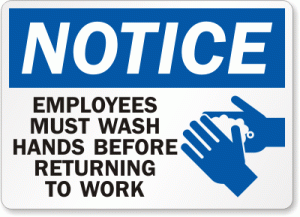“…For the chicken study, EHS-Net researchers interviewed 448 restaurant managers. They found that many were not following FDA guidance  about preventing cross-contamination and cooking chicken properly and that managers “lacked basic food safety knowledge about chicken”…40% of managers said they never, rarely, or only occasionally designated certain cutting boards exclusively for raw meat, and more than 50% said that thermometers were not used to determine the final cooking temperature of chicken. Further, only 43% of managers knew the recommended final cooking temperature…”
about preventing cross-contamination and cooking chicken properly and that managers “lacked basic food safety knowledge about chicken”…40% of managers said they never, rarely, or only occasionally designated certain cutting boards exclusively for raw meat, and more than 50% said that thermometers were not used to determine the final cooking temperature of chicken. Further, only 43% of managers knew the recommended final cooking temperature…”
A set of studies released this week by the Centers for Disease Control and Prevention (CDC) and its partners points to widespread holes in restaurant food safety systems, such as risky handling of ground beef and chicken and too-warm shipping temperatures for leafy greens.
Among the key findings, according to the study and a CDC summary:
- Eighty-one percent of restaurants used subjective measures of hamburger doneness, and 49% said they never checked the final cooking temperature
- At least two risky handling practices were seen in 53% of restaurants
- In 62% of restaurants in which workers used bare hands to handle raw ground beef, they did not wash their hands after handling it.
- Only 1% of restaurants reported buying irradiated ground beef, and 29% were unfamiliar with the product
- Chain restaurants and those with managers certified in food safety had safer practices than others.
At the same time, the CDC announced plans for a new surveillance system designed to help state and local health departments identify underlying factors that contribute to foodborne disease outbreaks in restaurants and other food service venues.
The research findings, published this week in the Journal of Food Protection, deal with the handling of ground beef, chicken, and leafy greens and with sick food workers.
For more:Â http://www.cidrap.umn.edu/news-perspective/2013/12/cdc-finds-holes-restaurant-food-safety-systems
http://www.cdc.gov/media/releases/2013/p1202-food-safety-tools.html








